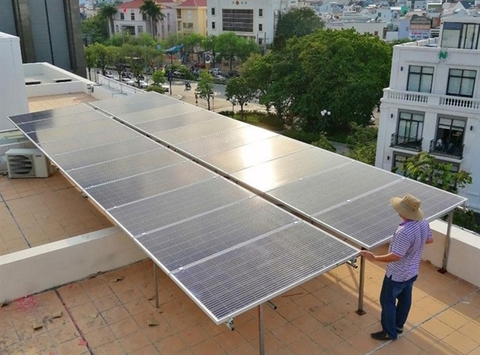Tuesday, 24/02/2026 | 18:15 GMT+7
Vietnam Electricity (EVN) has agreed to keep the current feed-in tariff of 9.35 US cents per kWh for rooftop solar power until 2021 as recommended by the Ministry of Industry and Trade.

The ministry had said it was essential to maintain this tariff until 2021 to encourage the development of rooftop solar.
The ministry has also asked EVN to be responsible for connecting rooftop solar power systems to the national electricity grid without overloading it.
More and more companies and households are installing rooftop solar power in HCM City.
Tran Trung Kien, owner of a home decor store in HCM City’s Cu Chi District, spent nearly VND100 million (US$4,300) installing solar panels on the roof of his newly built house.
He uses this power for daily activities and draws much less than he used to from the grid.
At the Saigon Hi-Tech Park, Sacom - Chip Sang Co., Ltd is using energy from a solar power system it installed atop its building.
The panels are also being installed at schools and people’s committee offices around the city.
The HCM City Power Corporation (EVNHCMC) has, in co-operation with suppliers of rooftop solar power facilities, installed them at many schools.
The People’s Committee of District 12 has installed a system on its 300sq.m office.
Binh Chanh District has 166 rooftop solar installations with a combined capacity of 5,283 kWp, 50 per cent higher than the target set by EVN, 152 in houses (1,945kWh), and the remaining at commercial establishments.
The Binh Chanh Power Company, a subsidiary of EVN, said it has launched campaigns to educate the public about the benefits of rooftop solar.
Besides, EVN and suppliers of rooftop solar power facilities offer incentives and promotions like a 10 per cent discount on solar panel prices, interest-free loans and payment in instalments.
It takes five to six years to recover the cost of the solar panels.
The city’s solar energy potential is very high since it has solar radiation of nearly 1,581 kWh per square metre per year.
The average number of sunshine hours is 100-300 and lasts throughout the year unlike in the northern region.
The highest radiation level is 6.3 kWh per square metre per day in February and the lowest is 3.3 kWh in July.
According to the World Bank’s “Report on Technical Assessment of Rooftop Solar Energy Potential in Viet Nam” in 2017 HCM City had solar power potential of 6,300MW.
Pham Viet Anh, Deputy Head of Communications at EVN in HCM City, said 3,741 households, offices and enterprises in the city had installed 42.7 MWP of rooftop solar. and 3,521 are connected to the grid.
Authorities should make installation of rooftop solar compulsory for administrative and non-commercial agencies and beneficiaries of public funding, and make it a criterion for evaluating and ranking enterprises, it said.
To encourage people to use rooftop solar, there should be subsidies and other support, it added.
The city grid has sufficient capacity to accept power supplied from rooftop solar systems.
The high cost of installing solar energy systems discourages many people and the solution is to offer preferential loans or incentives.
Nationally, rooftop solar power installation is expected to reach 2,000MW by the end of 2020, according to EVN.
As traditional power sources run out, the development of renewable energy infrastructure, including rooftop solar power, is crucial to providing enough power to Viet Nam's burgeoning needs.
Renewable energy experts said the country’s central and southern regions have huge potential to develop rooftop solar systems since they average radiation of 4.2-4.8kWh per square metre per day. — VNS








 Consultation on the methodology for developing and updating energy consumption standards for four major industrial sectors
Consultation on the methodology for developing and updating energy consumption standards for four major industrial sectors
 Opening of the 2025 Energy-Efficient Equipment and Green Transition Exhibition Fair
Opening of the 2025 Energy-Efficient Equipment and Green Transition Exhibition Fair
 Energy-saving solutions and green transition promotion
Energy-saving solutions and green transition promotion
 The 9th VEPG Steering Committee Meeting: Strengthening Coordination for Viet Nam’s Just Energy Transition
The 9th VEPG Steering Committee Meeting: Strengthening Coordination for Viet Nam’s Just Energy Transition